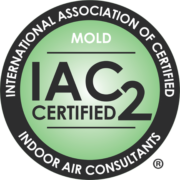
Mold Testing & Inspection
Let the certified experts at InspectorCor inspect and test your home for the presence of mold.
Understanding Mold
Mold is a fungal growth that, with suitable conditions, can form and spread on organic matter. The conditions that promote mold formation and propagation are damp decaying materials. Mold can be found both indoors and outdoors, but we are primarily concerned with indoor mold since it poses a health risk to our families. Indoor mold needs humidity and a source of nutrients, typically building materials like sheetrock, wood, carpets, paper, and other products used in home construction.
How does mold spread?
Mold spreads through the production of spores. These spores float through the air until they land on another surface. If that surface contains enough moisture and nutrients, then a new mold colony may form. Then the process repeats itself.
What is mold testing?
Mold testing involves securing a physical sample of the suspected growth. Samples are then sent to a specialized lab to determine the type of mold present. There are typically 3 types of collection methods used.
- Bulk samples. A piece of the sampled area is physically removed.
- Swab samples. A cotton swab is rubbed across the area being sampled, often a measured area.
- Tape samples. A piece of clear tape is pressed against and removed from the area being sampled. The goal is to remove a portion of the mold present on the surface.
What is a mold inspection?
A mold inspection is a visual examination of the property in question. A mold inspection may involve the removal of vents or cover plates, but it is a non-invasive inspection, meaning we don’t cut into walls, cabinets, flooring, or other covering materials. Unlike mold testing, a mold inspection doesn’t collect samples.
A comprehensive mold inspection is often the first step when determining if your home has mold and if testing should be conducted.
- Alternaria
- Stachybotrys (aka. Black Mold)
- Aspergillus
- Aureobasidium
- Chaetomium
- Penicillium
- Fusarium
Does mold exposure pose a health risk?
While mold is always around us, it can be a serious health risk for those who are sensitive or exposed to high levels of mold. According to the CDC, exposure to molds can lead to symptoms such as stuffy nose, wheezing, red or itchy eyes, or skin. More severe reactions may occur in people who are especially sensitive to mold exposure.
Certain molds, like Stachybotrys chartarum , more commonly known as Black Mold, produce toxins (mycotoxins). Enhalation of these mycotoxins over time may lead to a condition called mycotoxicosis.
Who is most affected by mold exposure?
- infants
- children
- women who are pregnant
- people with chronic respiratory conditions, like asthma
- people with allergies
- the elderly
- those are immunocompromised
How to reduce and prevent mold growth in your home
- Control humidity levels. (Below 60%)
- Quickly fix leaking pipes, roofs, windows
- Completely & Quickly dry areas affected by flooding
- Properly ventilate bathrooms, laundry, and cooking areas
Should I schedule a Mold Test?
We recommend scheduling a mold test and inspection if any of the following are true:
- Your home has experienced water damage
- Your home smells musty
- Your home has been closed up for an extended period of time
- Your home has a basement that stays damp
- You’ve noticed sustained water leaks
- You’re purchasing a home
- You’re considering renting a home
- You or your family members are experiencing respiratory issues, especially after spending extended time in your home.
- You or your family members have allergies or are immunodeficient.
